PoliticsNow: Scott Morrison, Anthony Albanese debate press freedom
Hours after launch of a press freedom campaign, the PM and Opposition Leader square off.
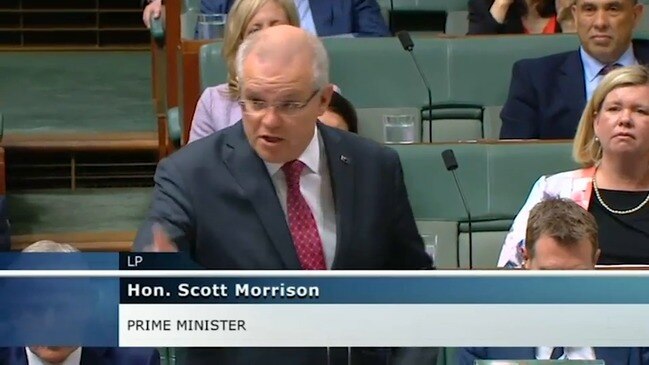
- Leaders battle over press freedom
- SHY slapped down on climate
- Hacking report to remain secret
- ‘Frightening that media is silenced’
- ‘Creeping culture of secrecy’
Hello and welcome to PoliticsNow, The Australian’s live blog on the happenings at Parliament House in Canberra. The government’s “big stick” energy laws, to prohibit misconduct in the energy market, will be debated today. The nation’s media companies have joined together to call for greater media freedom through The Your Right to Know Campaign.
• Top story: Press freedom stirs heated debate
Ben Packham: 9.20pm: Medivac refugees bypass hospital care
Fewer than one in 10 refugees and asylum-seekers transferred to Australia under Labor-backed medivac laws has required hospital treatment, and none is currently receiving in-patient care.
Operation Sovereign Borders head Craig Furini told Senate estimates on Monday that just 13 medical-transfer detainees, out of 135 brought to Australia so far, had been hospitalised.
“As of this morning, there are zero of those transferred in hospital,” Major General Furini said.
Greg Brown 9.05pm: Cost of housing Tamil family nearly $27m
There are more than 100 staff employed at the Christmas Island detention centre, despite its only inmates being a family of four that were moved there from the central Queensland town on Biloela.
The cost of housing the Tamil family, who were forced out of Australia because they were found not to be refugees, has amounted to nearly $27 million.
They have been the only people who have stayed at the facility since it reopened on February 16 after the medivac bill passed the parliament.
In Senate estimates, Greens senator Nick McKim questioned: “So we spent in the region of $30 million to detain four people for a couple of months. Is that right?”.
Australian Border Force Commissioner Michael Outram said the facility wasn’t established to detain four people.
“But you’re factually accurate what has been spent and there are four people in there now,” Mr Outram said.
Senator McKim hit back declaring reopening the Christmas Island facility was a “terrible decision” based on “flawed” advice from Department of Home Affairs secretary Mike Pezzullo.
Mr Pezzullo hit back declaring the department’s advice was designed when the “catastrophic” version of the medivac legislation passed the Senate last year.
“In terms of the version that then passed the House that had some moderated measures, it was still the judgement of the department in February … (the facility was) still required as a precautionary measure,” Mr Pezzullo said.
“That was before the Biloela family were ever on the horizon, it was a completely different track of consideration.
“We have shored up the risk of Operation Sovereign Borders by the Medivac legislations.”
Department officials confirmed there were four people on detention in Manus, including one who was on a resettlement pathway.
There are 47 asylum seekers in Port Moresby who are waiting to be resettled.
Perry Williams 7.10pm: Questions over $2bn Climate Solutions fund
Australia’s top energy bureaucrats have defended the government’s $2 billion Climate Solutions Fund despite conceding about a third of forecast emissions cuts needed by 2030 under the scheme are based on unknown technology improvements taking shape in the next decade.
The government expects at least 92 million tonnes of emissions outlined in the climate solutions package will be derived from technology advancements but said by their very nature it was unable to state what future innovations might entail.
“What we’ve found with the benefit of hindsight is that technology often moves more rapidly than programs or government funding and so it takes into account the fact there will be new technologies that will drive some abatement potential,” said Jo Evans, Deputy Secretary of Climate Change and Energy Innovation at the Department of Environment and Energy.
Greens Senator Sarah Hanson-Young said she was surprised at the lack of detail on a major part of the government’s climate scheme and questioned whether a “magic happens” approach was being adopted.
“I find it extraordinary that a third of the climate pollution reduction program is based on something that you can’t articulate,” Ms Hanson-Young said. “Is it just fingers crossed pray to the unicorn fairy god and hope that it happens?”
The Department of Environment and Energy acting secretary Rob Heferen also responded by saying the rapid advances in renewable energy technology in the last decade - which have reduced electricity emissions - were largely unseen by many in the industry.
“Ten years ago if people were sitting here saying we think the uptake of solar PV would be probably the fastest in the world, certainly per head, I don’t think it would have been accepted,” Mr Heferen said. “Certainly 15 years ago the idea of electricity generation from wind wouldn’t have been thought of. So the idea of saying we anticipate technology will provide these opportunities in the future is reasonable.”
Michael Roddan: 5.45pm: No clarity on Hillsong head’s invite
The government has refused to clarify whether Scott Morrison invited the head of the Hillsong church to dinner at the White House hosted by Donald Trump out of concern it could “impact on international relations”.
Appearing before a Senate Estimates hearing, first assistant secretary in the Department of Prime Minister and Cabinet, Gerard Martin, said: “Any matters related to compilation or consideration of the guest list for a state dinner provide by the United States would be a matter that might impact on international relations.”
Rosie Lewis 5.01pm: Morrison accused of contradicting A-G
Scott Morrison has been accused of making an “extraordinary intervention” in the press freedom debate after he declared it should not be up to politicians to decide who should be prosecuted, despite a new directive that gives the Attorney-General that exact power.
The Prime Minister said in question time: “I do not believe that those decisions about who should be prosecuted at the end of the day should be made on the whim of politicians. I think they should be made based on the rule of law and the proper assessment of appropriately constituted law enforcement agencies.”
But last month Attorney-General Christian Porter issued a directive that ensured he would be required to give consent for a prosecution to proceed against a journalist where the Commonwealth Director of Public Prosecutions considers there is a public interest.
Opposition legal affairs spokesman Mark Dreyfus said Mr Porter must immediately clarify what Mr Morrison’s comments meant for the directive.
“This is an extraordinary intervention by Mr Morrison which directly contradicts the directive by his Attorney-General,” Mr Dreyfus said.
“Clearly the government is making this up on the run, and are internally divided on this important issue.
“It was the PM who glibly declared that he ‘wasn’t troubled’ by the police raids on journalists. Now it seems the PM is overruling Mr Porter on this matter.”
4.50pm: Protest laws to get green light
Laws to stop protesters using dangerous devices to lock themselves to roads and train tracks are set to be passed in Queensland this week, AAP reports. It comes after a committee made up of a cross-section of MPs gave the state government the green light to pass the controversial Bill, which is due for debate in parliament this week.
The laws are part of the state government’s crackdown on environmental protests that have brought coal-carting trains to a halt, as well as peak-hour traffic in Brisbane.
The committee that vetted the laws said concerns about them had been raised in submissions by the Human Rights Law Centre, Caxton Legal Centre, the Environment Council of Central Queensland Inc and Professor Janet Ransley, director at the Griffith Criminology Institute.
They raised concerns that claims that protesters had been using locking devices containing traps or dangerous substances had not been substantiated, the committee report said on Monday.
The committee said it had carefully considered the submissions, despite not being able to discuss them in as much detail as usual because its examination period was cut short.
Hundreds of demonstrators are expected to protest against the laws outside parliament on Tuesday.
— AAP
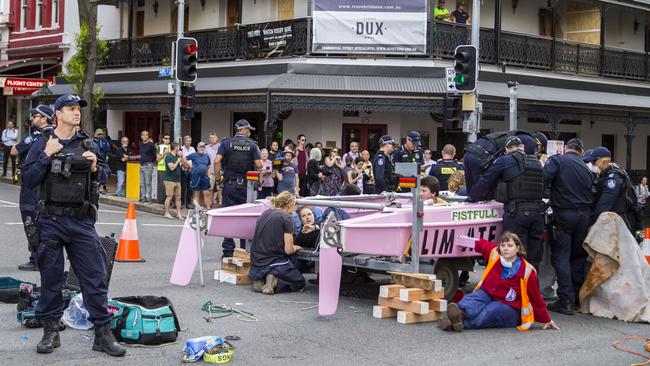
4.25pm: Reef bleaching ‘natural’
A defiant Pauline Hanson has told the Great Barrier Reef Marine Park Authority’s top scientist that coral bleaching is a natural occurrence, rejecting its link to heatwaves, AAP reports.
The Queenslander used a Senate estimates hearing on Monday to question the link between extreme heat and back-to-back masscoral bleaching events in 2016 and 2017.
“You’re saying that coral bleaching is affected by water temperatures,” she told David Wachenfeld.
“Yet around Indonesia, closer to the equator ... where the water temperatures are 29 degrees, it’s a known fact that coral actually grows faster and more prolific in warmer temperatures.”
Dr Wachenfeld explained that corals lived in a variety of water temperatures across the world, with substantial differences even within the Great Barrier Reef.
Corals bleach when stressed — such as when exposed to warmer than normal temperatures — and die if stressed for prolonged periods, he told the senator. “The fact that corals in Indonesia could withstand higher temperatures than corals on the central Great Barrier Reef is of no benefit to the corals of the central Great Barrier Reef when they die.”
— AAP
Olivia Caisley 3.50pm: What we learned in Question Time
Labor needled the government over infrastructure spending in Question Time on Monday, forcing Scott Morrison to answer where the government had delivered its promised funds.
Opposition infrastructure spokeswoman Catherine King called on the government to answer why the government spent $17 million to advertise the urban congestion fund in the lead-up to May’s election, but was yet to spend any of the advertised fund on infrastructure projects. Cities Minister Alan Tudge fired back, saying the government had targeted 166 projects to fund across Australia’s largest capital cities.
He said the government had begun to “work with the states and territories on every single one of those projects”.
But Labor pounced again with a question from Member for Oxley Milton Dick, who called on Mr Morrison to confirm that for every $100 of the Roads of Strategic Importance fund only 50 cents would be spent in Queensland in 2019.
Deputy Prime Minister Michael McCormack took the question, saying the government was doing everything it could to ensure roads and ports were built.
“Those opposite wouldn’t have ever funded a program such as the Roads of Strategic Importance because they never, ever worried about a regional program unless they could rort it,” Mr McCormack said.
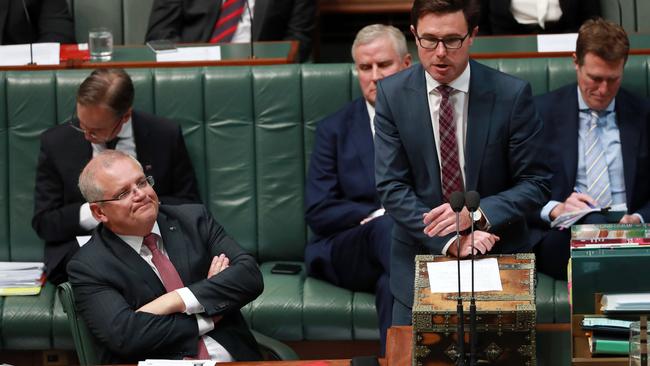
While brandishing the heavily-redacted front pages of the nation’s newspapers, Labor leader Anthony Albanese asked Mr Morrison to answer whether he would rule out prosecuting the ABC and News Corp journalists at the centre of Australian Federal Police investigations over their reporting.
It came as the nation’s media organisations launched a united campaign on Monday following a sustained attack on the rights of journalists to hold governments to account and report the truth to the Australian public.
Mr Albanese asked whether Mr Morrison agreed journalism wasn’t a crime.
Mr Morrison said that while he agreed, “no-one in this country is above the law.”
“People should not be prosecuted for their profession,” he said. “They should only be prosecuted if indeed they have been found to be falling foul of the law.”
He took aim at Labor, who he said “sought to gag the press in this country with their failed media reforms” when they were in power.
And that’s it for Question Time. Stay tuned to PoliticsNow for the latest in Senate Estimates.
3.30pm: Refugee update
There are twice as many asylum-seekers in Australia for medical treatment than remain in Papua New Guinea and Nauru, AAP reports.
Home Affairs secretary Michael Pezzullo says 562 people remain in offshore processing in PNG and Nauru, while 1117 have been brought to Australia for medical treatment or to accompany family members.
Meanwhile, 632 people have been transferred to the US under a refugee resettlement deal.
The deal was expected to accommodate up to 1250 people.
There are more than 205,000 people in Australia on bridging visas, while about 62,000 people in the country have overstayed their visas, a Senate estimates hearing was told on Monday.
— AAP
Olivia Caisley 3.11pm: Parks and exhortation
Member for Lingiari and Labor MP Warren Snowdon asks how the government expects to “unlock the full potential” of Kakadu National Park when it’s pushed back the start date for upgrading roads in the park beyond the next Federal election.
Environment Minister Sussan Ley shoots down Mr Snowdon’s question, saying she finds it “quite extraordinary” the Labor MP would characterise the $216 million upgrade as “somehow insufficient”.
“We know what happens when you roll out an infrastructure program too quickly because we saw it in government with Labor time after time,” Ms Ley says. “We know what happens when you shovel the money out the door — no policies or guidelines.”
Ms Ley says she visited the park recently and the traditional owners were happy with the progress.
“We have good relationships with the Northern Territory government. We’re not playing politics about this. How could you come into this place and talk this sort of nonsense?”
Olivia Caisley 3.05pm: Labor chases the dollar
Labor leader Anthony Albanese asks Infrastructure Minister Michael McCormack to confirm the government’s promised funding for key infrastructure projects has fallen short by hundreds of millions of dollars.
Mr McCormack says: “I’m happy to provide an update to the Opposition Leader about all of those projects. But rest assured, we’re getting on with the job of building a better future, building a better Australia.”
Mr McCormack says many MPs are “delighted” to be getting the infrastructure their electorates need.
Olivia Caisley 3pm: Payne barrier
Member for Canberra and Labor MP Alicia Payne asks Scott Morrison to answer whether he has spent $5 billion less on infrastructure that was promised in the lead up to the May election.
“As the members opposite would know, the program and schedule of projects, which the government pursues is one that is put together in partnership with the states and territories,” the Prime Minister says.
“Under our government, this year we will spend around $10 billion on infrastructure,” Mr Morrison says. “That is what is budgeted to be spent in this very financial year.”
Olivia Caisley 2.50pm: Road kill
The Member for Oxley Milton Dick calls on Scott Morrison to confirm that for every $100 of the Roads of Strategic Importance fund only 50 cents will be spent in Queensland in 2019.
Deputy Prime Minister Michael McCormack takes the question.
“We’re getting on with making sure that we build the roads, build the ports, and do everything that we need to do as a government to build a better Queensland,” the Deputy Prime Minister says.
“Those opposite wouldn’t have ever funded a program such as the Roads of Strategic Importance because they never, ever worried about a regional program unless they could rort it.”
Olivia Caisley 2.40pm: Projects in the pipeline
Another question on infrastructure project funding.
Member for Jagajaga and Labor MP Kate Thwaites asks Scott Morrison to confirm that none of the eight Victorian projects listed under the Roads of Strategic Importance Fund have reached the planning stage.
“I’ve been very pleased to be working closely with the Premier of Victoria and to be able to be making so much progress to ensure that both governments can work together to deliver these projects in the years ahead,” the Prime Minister says.
Deputy Prime Minister Michael McCormack also steps up to the dispatch box and says the government has committed funding to 26 projects in Victoria, totalling $874.9 million.
Olivia Caisley 2.35pm: Congestion busting
Opposition infrastructure spokeswoman Catherine King calls on the government to answer why the government spent $17 million to advertise the urban congestion fund in the lead-up to May’s election, but is yet to spend any of the fund on infrastructure projects.
Cities Minister Alan Tudge says the government has targeted 166 projects to fund across Australia’s largest capital cities.
He says the government has begun to “work with the states and territories on every single one of those projects.”
The chamber is particularly testy today and Speaker Tony Smith says his patience is wearing thin. He asks MPs to stop interjecting.
Olivia Caisley 2.25pm: Taking care of business
Opposition Treasury spokesman Jim Chalmers asks why the government is refusing to answer the calls of key business industry groups to bring forward infrastructure investment and boost the economy.
Mr Morrison pours cold water over the claim, saying the government is in fact funding infrastructure investment with the current budget dedicating almost $10 billion to that cause.
He says the government is training people with the skills they need for the future, while delivering tax relief to Australians across the country.
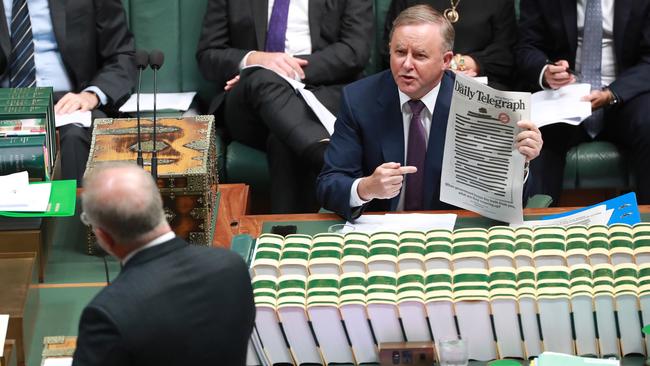
Olivia Caisley 2.20pm: PM weighs in on press freedom
Labor leader Anthony Albanese begins his next question by holding up each of the heavily-redacted front pages of the nation’s newspapers.
It comes as the nation’s media organisations launched a united campaign on Monday following a sustained attack on the rights of journalists to hold governments to account and report the truth to the Australian public.
Mr Albanese asks whether the Prime Minister will rule-out prosecuting the ABC and News Corp journalists at the centre of Australian Federal Police investigations over their reporting.
“Does the Prime Minister agree that journalism is not a crime?” Mr Albanese asks.
Mr Morrison fires back, saying that while he agrees journalism is not a crime, “no-one in this country is above the law.”
“People should not be prosecuted for their profession,” Mr Morrison says. “They should only be prosecuted if indeed they have been found to be falling foul of the law.”
Mr Morrison then takes aim at Labor, who he says “sought to gag the press in this country with their failed media reforms” when they were in power.
“If we get to the point where the leader of the opposition wants to arbitrarily, outside the law decide who gets prosecuted and who doesn’t, then that’s not a country that I think Australians would want to live in,” he concludes.
Olivia Caisley 2.10pm: Cross-party cabinet?
Labor leader Anthony Albanese kicks-off question time by calling on Scott Morrison to answer whether he will convene a cross-party drought cabinet to respond to the drought emergency.
It comes after opposition resources spokesman Joel Fitzgibbon last week appealed to the Prime Minister to “stop the spin” and form a war cabinet with Anthony Albanese to tackle the drought.
Mr Morrison doesn’t strictly answer the question but outlines recent changes to the Farm Household Allowance that have increased funding for desperate farmers and struggling communities.
“That’s our plan. We’re getting on with it. We’ll continue to get on with it will being to farming communities,” Mr Morrison says.
Rosie Lewis 2.05pm: Labor in the loop on FTAs
Trade Minister Simon Birmingham has made a dozen commitments to Labor — including a pledge to expedite legislation to criminalise the worst forms of worker exploitation — in order to gain its support for the Indonesia, Hong Kong and Peru free trade agreements.
Following a ferocious attack from the unions over his support for the deals, Anthony Albanese declared the FTAs would directly create jobs in the steel, agriculture and cattle industries and the agreements had been “fixed up” thanks to the government promises.
“This is not an agreement that Labor would have made,” the Opposition Leader said.
“We would have made different provisions but it is an agreement the government has put forward and one in which overall provides benefits for Australian workers, Australian jobs and for our national economy, which is why Labor will be supporting these three agreements on the floor of the parliament.”
Senator Birmingham said no renegotiation of, or changes to, any of the treaties were required as a result of the commitments made.
Government sources described the changes as reforms that could be made around the edges of the FTAs.
“Our government has provided reassurance to Labor in a number of areas where clear misconceptions were held. These include making clear that there are no privatisations required under these agreements,” Senator Birmingham said.
“We have also confirmed our continued pursuit of actions such as updating safeguards in old investment treaties and strengthening workplace protections for working holiday makers.
“Although they should not have been necessary to secure Labor’s support, these commitments are extremely modest compared to the many job creating benefits of these agreements. Once again, our government is demonstrating that we can deliver for Australians in the national interest.”
The government plans to pass the trade deals in the House of Representatives on Monday and push them through the Senate by the end of the year.
Olivia Caisley 2pm: Climate ‘emergency’ fails to rate
Labor moved to declare a climate change emergency in the lower house on Monday with just a handful of its MPs in attendance.
Opposition climate change spokesman Mark Butler delivered an impassioned speech when introducing the motion on Monday, declaring the government was “failing” Australian children on climate inaction.
Mr Butler said reports from the Intergovernmental Panel on Climate Change made it clear the window is closing for the world to cap global warming at two degrees, or ideally 1.5C.
“We’re frankly just not on track to meet those,” Mr Butler told the lower house on Monday.
“We are failing our children. We are failing our grandchildren, and generations beyond that.”
“This motion is a chance for the parliament to change course,” he said. “It is an attempt to have the parliament recognise the gravity of this challenge.”
Labor MPs Tim Watts and Pat Conroy were among those who joined Mr Butler in the House of Representatives.
But the poor turnout from Labor politicians after a similar motion fell short in the Senate last week, saw opposition leader Anthony Albanese leap to his party’s defence at a press conference in Canberra on Monday.
“The idea that an issue’s importance is determined by how many people are in the chamber I don’t think stands up to scrutiny or consistency,” Mr Albanese said.
Speaking after Mr Butler moved the motion, Nationals MP Pat Conaghan dismissed the climate emergency motion as “redundant” and accused Labor of “jumping on sensational and populist sentiment.”
It comes as Energy Minister Angus Taylor accused Labor of making a “song and dance about declaring a climate emergency”, while refusing “to commit to a single policy in this area.”
“This shows what an absolutely empty gesture Labor’s attempted declaration is,” Mr Taylor told Sky News on Monday. “It is intended to cover for their total absence of real and meaningful policies.”
Last week Mr Albanese’s state colleague, Victorian Premier Daniel Andrews ruled-out a climate emergency motion.
Mr Andrews told the state parliament: “What we are about is not motions and words but actions.”
Perry Williams 1.30pm: Snowy budgets for the ‘unexpected’
Snowy Hydro has a contingency budget in place to cover unexpected costs on its Snowy 2.0 project but will not publicly reveal the scope of the buffer to ensure the scheme’s builder focuses on delivering its $5.1 billion contract.
Snowy chief executive Paul Broad told Senate estimates on Monday that while its $5.1bn construction deal with Australia’s Clough and Italian group Salini Impreglio reflects the future escalation of prices through the eight-year build, it also holds a separate contingency fund in place for the mammoth project.
“We put a contingency on top of those numbers in case there is something like an environmental issue or something of that nature that we have to cover. But part of contract negotiations is that you don’t want to signal to the contractor what you might have in your own contingency because they’ll want to come back — and it’s in their interests to come back,” Mr Broad said.
Asked by Greens senator Sarah Hanson-Young for the scope of the contingency, Mr Broad declined to specify.
“I don’t like to signal. I could give it to you in confidence but I don’t want to signal.”
Snowy’s chief executive agreed to provide details to Ms Hanson-Young privately.
The original feasibility study for Snowy estimated a budget ranging between $3.8bn and $4.5bn in real dollars which increased to $5.1bn including fixed cost escalation over the construction period.
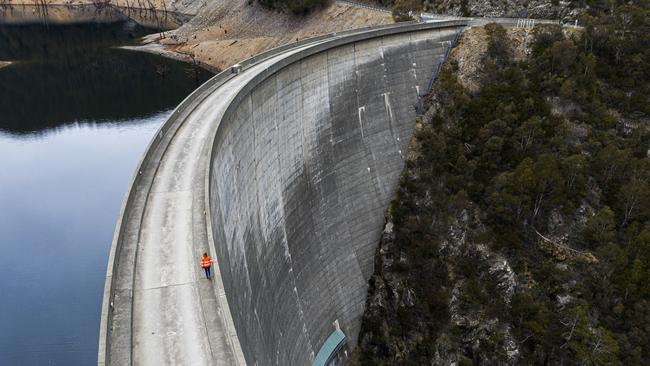
That jump sparked speculation costs could rise further given the long life of the project.
The total cost of the project was originally estimated at about $12bn, including a build cost of $4.5bn, a $6bn investment by the federal government to buy out the states and an estimated $1.5bn to $2bn for transmission upgrades to get the power into the grid. Snowy expects 2.0 would deliver an 8-9 per cent return for taxpayers from 2025.
Mr Broad also shrugged off last year’s demise of the national energy guarantee and broader policy instability, citing figures showing the renewables boom would need significant firming back-up to ensure the power grid remains stable.
Some 11500 megawatts of renewables was available in the national electricity market during the day on October 18 which then declined to just 2500MW once the sun went down and the wind died off.
“Hence there was a 9000MW swing depending on what the wind was doing and whether the sun was shining across the day, so that gives you a sense of the scale of the challenge we have in balancing the output of renewables. Hence the viability of Snowy 2.0 going forward to balance that swing that we are seeing,” Snowy’s chief operating officer Roger Whitby said in response to questions from South Australian senator Marielle Smith.
The expansion scheme, designed to “firm” renewable power, expects to purchase power off-peak at $40/MWh, using it to generate hydro power which would be sold into the market at peak periods at about $100/MWh.
Snowy 2.0 will use electricity mostly from wind and solar plants during off-peak periods to pump water from one reservoir in the Snowy Mountains to a higher one through a massive tunnel; and reversible turbine system. It would generate electricity during periods of high demand by running the water downhill through the same turbines.
Dennis Shanahan 1.00pm: No sign of voter remorse
There is one stand-out conclusion from the latest Newspoll survey showing the Coalition’s primary vote support at 42 per cent: there is no sign of buyers’ remorse from voters in the five months since the election.
People who think voters “got it wrong”, or that voters think they got it wrong, are just wrong.
A clear majority voted for the Coalition and aren’t changing their minds.
Click here to read Shanahan’s commentary in full
Graham Lloyd 11.50am: Reef ‘has vibrant future’
The Great Barrier Reef Marine Park Authority has supported environment minister Sussan Ley’s appraisal that the reef was “good” and had “a vibrant future”.
GBRMPA chief executive Joshua Thomas told Senate estimates the downgrading of the reef condition from poor to very poor by a long term monitoring survey was a long term outlook based on climate change under current trajectories.
In many areas current conditions remain in good or very good condition, GBRMPA said.
It said Senator Ley had been referring to “many areas on the reef remain vibrant and worth visiting and we agree with that statement”, the authority said.
Graham Lloyd 11.40am: Oz ‘active participant’ in emissions targets
Australia’s carbon emissions targets were ambitious and more difficult to achieve than those promised by many other countries, the senate estimates hearing has been told.
Deputy secretary for climate change, Jo Evans, said Australia was an “active participant“ in global efforts under the Paris Agreement.
“If you look at what other countries have done and compare other countries to it we are among the strongest targets in the OECD”, she said.
This was confirmed by a recent IMF report that said the cost to Australia was higher than for other countries “is an independent assessment that our target appears to be challenging”, Ms Evans said.
Ms Evans said the science did not specify a target for Australia.
“It says if we are to have a good chance of holding temps to below two degrees then at least developed countries need to be at net zero emissions by some time in the second half of the century”, Ms Evans said.
“Whether Australia’s current target of 26 to 28 per cent below 2005 levels is in line with that I think we are in line with that as it is part of a global solution and collective action,” she said.
Ms Evans defended the use of carry over permits from the Kyoto Protocol because it had always been a part of the international framework not to punish countries for doing better than they had promised.
Graham Lloyd 11.30am: SHY slapped down over climate
Greens senator Sarah Hanson-Young has been slapped down by the federal environment department on attempts to declare a climate emergency.
Deputy Secretary for Climate Change and Energy Innovation, Jo Evans, said the department would not use the word emergency but we would “stick to a factual description.”
“I am not using the word emergency, you are”, she said.
Ms Evans said average temperatures had risen by about one degree, eight of the ten warmest years had occurred in the past decade and sea levels were rising.
However, she said whether or not the climate was getting worse was a “judgment call” and “opinion”.
“The climate is changing”, Ms Evans said.
“Whether you choose to use terminology to describe that as worse or better depends where you are on the globe.
“Some parts of the world will find some of those changes working to their advantage, some not so much”, she said.
Michael Roddan 11.05am: Cyber-attack report stays secret
A confidential report into a cyber-attack on parliamentary systems in February by a “sophisticated state actor” is likely to remain secret, according to Senate president Scott Ryan.
Senator Ryan said he received the report into the hack last week and was awaiting a “lay language” briefing on its contents before any future potential update on the attack.
Scott Morrison told Parliament in February that the computer networks of Australia’s major political parties were the subject of the cyber-attack by a “sophisticated state actor”
Previously Australia has blamed China and Russia for cyber-attacks and China in February rejected that its agencies were behind the cyber-attack on federal parliament.
Appearing before a senate estimates hearing, Senator Ryan said he did not believe the report into the hack ‘will be appropriate for redaction or publication”.
“I am not convinced that publishing the report I have received, even in redacted form, will be helpful,” he said. “It is purely a personal view — I haven’t discussed it with the speaker or officials.
“There are obviously implications for our future security as a parliament as well as our cooperation with various agencies.”
Centre Alliance senator Rex Patrick asked Senator Ryan to name the “sophisticated state actor” behind the attack.
“In the media it was reported that China was involved. Are you aware of which state actor it is?” Senator Patrick said.
However, Senator Ryan declined to name which country was behind the attack.
“I don’t think that these matters are appropriately canvassed in these public forums,” he said.
Reuters reported last month that Australian intelligence agencies determined China was responsible for the cyber attack. According to Reuters, Australia’s cyber intelligence agency — the Australian Signals Directorate — concluded in March that China’s Ministry of State Security was responsible for the attack but government agencies recommended keeping the findings secret in order to avoid disrupting trade relations with Beijing.
The Australian government has not disclosed who it believes was behind the attack or any details of the report.
When the hack was discovered, Australian politicians and their staff were told by the Speaker of the House of Representatives and the President of the Senate to urgently change their passwords.
Ben Packham 11.00am: Be fair in Pacific, China told
The Pacific Islands Forum has warned China its engagement with the region must be fair and respectful, and called on the country to do more to curb its carbon emissions.
PIF secretary-general Dame Meg Taylor told a high-ranking Chinese delegation in Samoa, led by Vice-Premier Hu Chunhua, that intensifying geopolitical competition in the region had put the Pacific in a strong position to be “more considered and assertive with its priorities for engagement”.
“Excellencies, we are not ignorant to the heightened evolution of partnership relationships in the Pacific region and the advantages and disadvantages these offer,” she told the Third China-Pacific Island Countries Economic Development and Co-operation Forum in Apia.
To read the story in full, click here.
Olivia Caisley 10.10am: AFP head orders investigations review
The new head of the Australian Federal Police has ordered a review into the handling of sensitive investigations, following dual raids on News Corp journalist Annika Smethurst and the Sydney headquarters of the ABC.
Reece Kershaw wants to examine processes around unauthorised disclosures, parliamentary privilege, espionage, foreign interference and war crimes and has asked John Lawler, the former head of the Australian Crime Commission, to conduct the external review.
Speaking at a Senate committee in Canberra on Monday Mr Kershaw said the review would not be an audit into the “current matters at hand”, but “a holistic approach to ensure that we have in place investigative policies and guidelines that are fit for purpose.”
“The review will address what constitutes a sensitive investigation and examine what resources are required to approach such inquiries,” Mr Kershaw said.
The new police boss also indicated it would involve a “reformation” of the AFP’s governance, business processes and organisational structures.
Had the new @AFPCommissioner seen the front pages of today's newspapers? #righttoknow #pressfreedom@australian @smh @FinancialReview @theage @dailytelegraph @theheraldsun @couriermail @westaustralian @theTiser @TheNTNews @themercurycomau @canberratimes @withMEAA pic.twitter.com/QhRVUVZpeh
— Kristina Keneally (@KKeneally) October 20, 2019
It comes as the AFP raids triggered a major debate about press freedom, prompting a joint response from media organisations on Monday, where they joined forces to call for reforms to protect public interest journalism
When asked by opposition home affairs spokeswoman Kristina Keneally to comment on the redacted front pages of newspapers across the nation, Mr Kershaw said he didn’t know what prompted the campaign.
Olivia Caisley 9.25am: Miller: Frightening that media is silenced
News Corp Australasia Chairman Michael Miller says he is concerned essential information is being kept from the Australian public, declaring “it is frightening to think the media is being silenced by the government.”
It comes as the nation’s media organisations united against growing censorship on Monday, asking the government to rethink the threat of criminal charges for journalists after dual raids on News Corp journalist Annika Smethurst and the public broadcaster in June.
““Nobody here is saying that anyone should be above the law. The question is, does the law serve the public interest?,” Mr Miller told 2GB Radio.
“If government operates on the basis of a culture which is, keep things secret because we don’t want it being discussed, then I think we as people, we as taxpayers, we as effectively owners of the government lose out. Because we don’t have the information on which to make informed decisions.”

He was joined by Nine CEO Hugh Marks, who said he agreed new national security laws needed to be revised to stop a “concerted campaign”, which was preventing the everyday work of ordinary journalists.
“The way they were introduced was to create an offence for journalism in the first place, which the journalist and their media organisation need to defend,” Mr Marks said. “What we’re seeing here is not a slow creeping but basically a pretty concerted campaign, and it’s been happening over many years, to hide behind national security and secrecy over the public’s right to know key information.
“That’s not a culture we should live in.”
Olivia Caisley 9.10am: ‘Creeping culture of secrecy’
Senior News Corp executive Campbell Reid has rebuked Attorney-General Christian Porter’s characterisation of the press freedom debate after he said the media’s demands for law reform were “on the outer edge of workability.” Mr Reid told ABC Radio on Monday the government was engaged in “misinformation” in its portrayal of the press freedom issue in Australia.
It comes as Mr Porter told ABC’s Insiders on Sunday the Right to Know Coalition had made demands for journalists to “have a blanket exemption from all national security and secrecy laws.”
“I’m not so sure that those demands aren’t sort of out on the outer edge of workability and credibility,” Mr Porter told Insiders.
But Mr Reid rejected the Attorney-General’s comments, saying: “To characterise it as a blanket exemption is to wrongly create the impression the journalists are seeking carte blanche,” Mr Reid said. “What we are actually seeking is the kind of working regime that exists in every other country we consider ourselves equal to.”
Mr Reid also took aim at “creeping culture of secrecy” that extended to suppressed court cases and Freedom of Information requests.
The nation’s media organisations launched a united campaign on Monday to call on the government to rethink the threat of criminal charges for journalists after dual raids on News Corp journalist Annika Smethurst and the public broadcaster in June.
READ MORE: You have a right to be suspicious and uneasy | Don’t scare whistleblowers into silence | Ideological journalists hurt their case | Perverts named and shamed in SA | National security excuse to hide truth | Why I can’t tell you the full story | Public demand right to know | Only journalism can keep the government accountable
Olivia Caisley 8.18am: Freedom ‘cuts both ways’
Barnaby Joyce has argued media freedom “cuts both ways” as Australia’s media companies unite against growing censorship and attacks on journalism from the federal government.
The Nationals backbencher, whose personal life made headlines in 2017 over revelations he was expecting a baby with a former staffer, acknowledged a free press was vital for a functioning democracy. But Mr Joyce said media freedom must be used responsibly.
“To get respect around the term public interest, you’ve got to act in the public interest,” he told reporters in Canberra on Monday.
“You can’t say putting a private individual — a pregnant woman crossing the street — on your front page is in the public interest, which you did, and give yourself a Walkley for it.”
Olivia Caisley 8.15am: ALP frontbenchers back freedom
Labor frontbenchers have publicly backed the Right to Know Campaign for press freedom, declaring they support the fight against “the Morrison Government’s intimidatory assault on our democracy.”
The nation’s media organisations launched a united campaign on Monday to call on the government to rethink the threat of criminal charges for journalists after dual raids on News Corp journalist Annika Smethurst and the public broadcaster in June.
Labor frontbenchers, including opposition legal affairs spokesman Mark Dreyfus, opposition home affairs spokeswoman Kristina Keneally and opposition spokeswoman for communications Michelle Rowland, seized on the campaign, using it to continue their attack on the Morrison government’s “culture of cover-up and denial.”

In a joint statement, they said Labor stood “side by side” with the campaign and called on the government to rule out the prosecution of the journalists at the centre of the raids. They also called for greater protections for whistleblowers and journalists.
“This arrogant Government believes no one is above the law except them,” they said in a statement. “Scott Morrison and his senior ministers treat “press freedom” as if it were an inconvenience rather than as an essential pillar of our democracy.”
“Labor believes a strong and independent media is vital to holding governments — and opposition parties — to account and Labor will continue to stand with journalists and the Right to Know Coalition to fight to defend and to strengthen press freedom.”
Olivia Caisley 8.00am: Taylor: Balance freedom with security
Energy Minister Angus Taylor says he acknowledges free press is “central to democracy”, but warns press freedom concerns should always be balanced against national security considerations.
The nation’s media organisations launched a united campaign on Monday to call on the Morrison government to rethink intense government secrecy and the threat of criminal charges for journalists after dual raids on News Corp journalist Annika Smethurst and the public broadcaster in June.
Speaking on Sky News on Monday Mr Taylor refused to be drawn on whether the government would act to relieve concerns, saying he would await the result of an inquiry by the Parliamentary Joint Committee on Intelligence and Security, which is investigating the issue.
“I absolutely respect the fact freedom of the press is central to democracy, so too is protecting the security of all Australians,” Mr Taylor said. “We’ve got to strike that balance. It is a very important debate.”
What’s making news:
An exclusive Newspoll conducted for The Australian shows no change in the headline numbers for the government, with the Coalition holding a two-party preferred lead of 51 per cent to 49 per cent.
The goods and services tax would be broadened, stamp duties scrapped and messy federal-state funding agreements abolished under a call for a major reform of the federation proposed by the NSW government.
Josh Frydenberg has insisted he will “stay the course’’ on the budget surplus as he returned from a meeting of international finance ministers that warned of “elevated downside risks’’ to world growth and called on governments to employ all appropriate policy tools.
Attorney-General Christian Porter has rejected a key concern from big business over the Morrison government’s draft religious discrimination bill, saying they had gone “a little bit too far” in telling employees what they can and can’t say outside work hours.
Three Labor MPs — Warren Snowdon, Luke Gosling and Malarndirri McCarthy — narrowly survived a motion that could have seen them expelled from the party because of Anthony Albanese’s decision to support the Indonesia and Hong Kong free-trade deals.
Labor frontbencher Joel Fitzgibbon has called for an overhaul of the “look the other way culture” within the Agriculture Department, after allegations of animal cruelty at a Queensland abattoir.
ACT residents who possess or use small amounts of cannabis could still be fined about $100 when new laws legalising the drug take effect, forcing the territory government to rethink legislation.
Alice Workman’s Strewth: As of June 30 Parliament House was valued at $2.35bn, according to the Australian National Audit Office.
Simon Benson writes: Scott Morrison has been vindicated in his determination to stay the course on the economy.
Additional reporting: Agencies

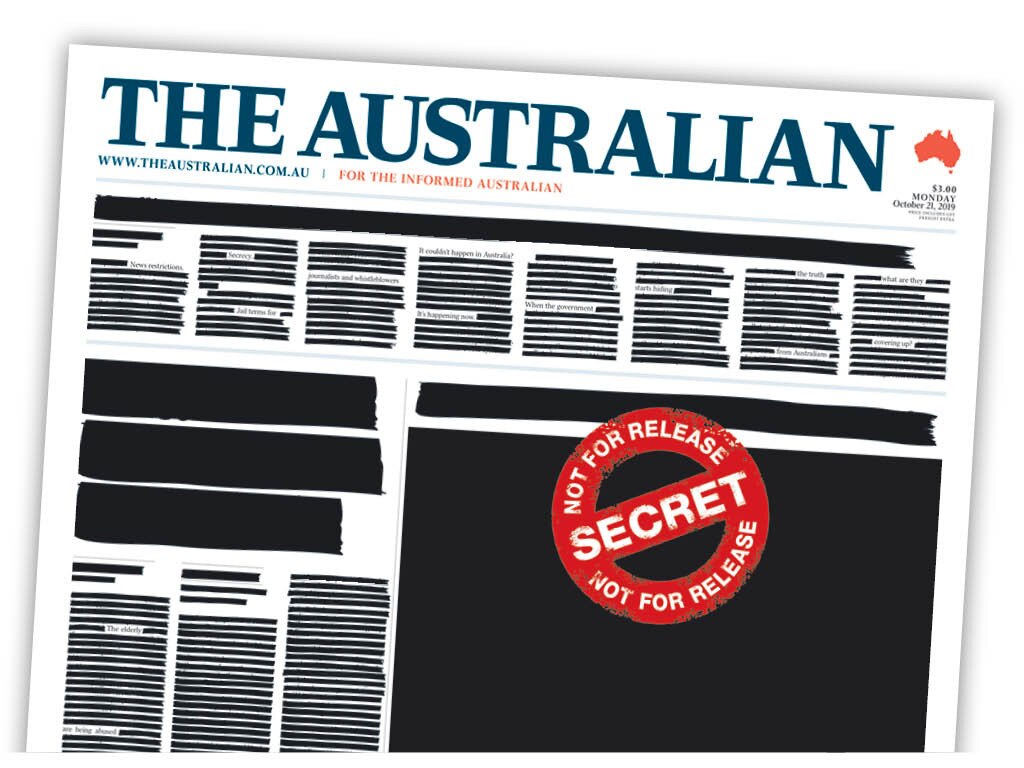
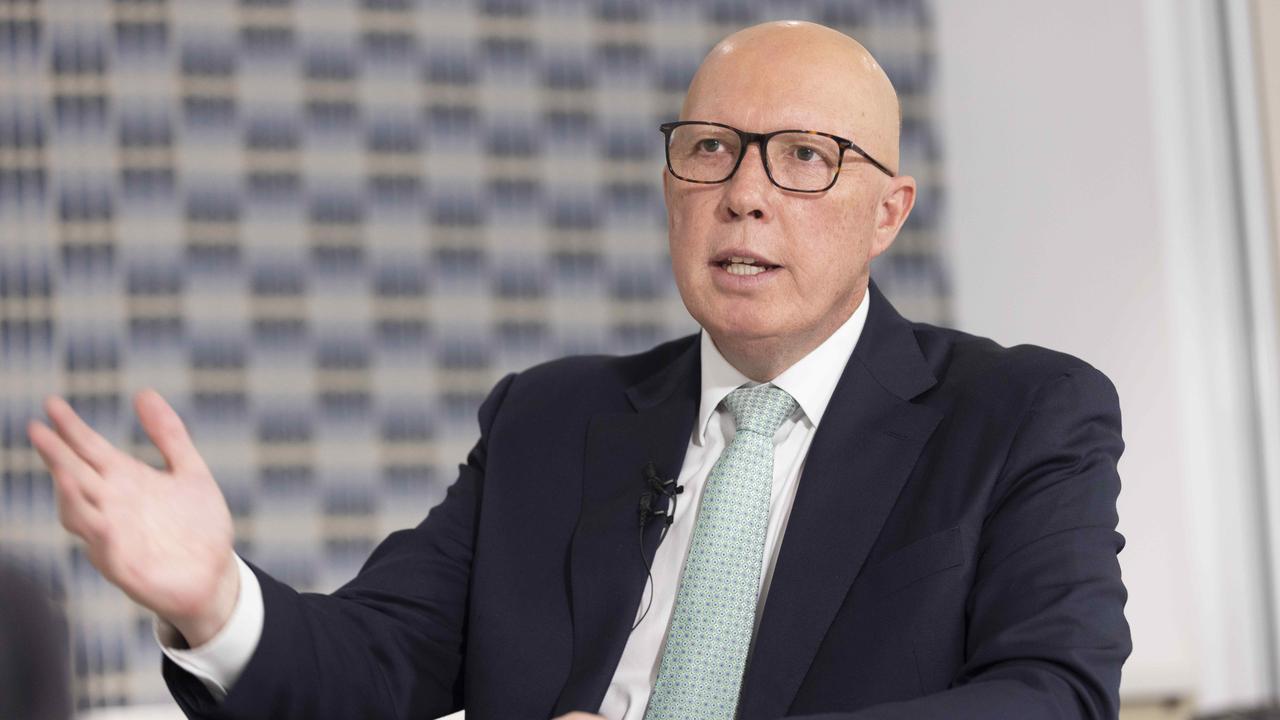
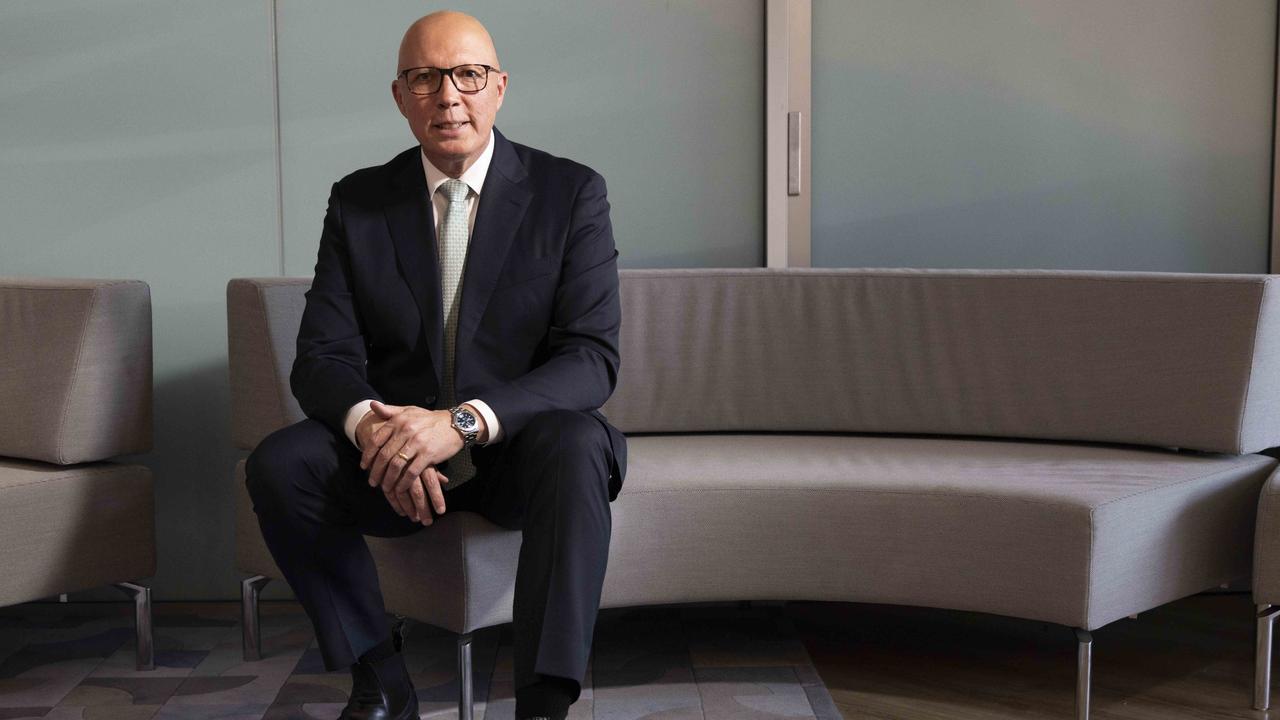
To join the conversation, please log in. Don't have an account? Register
Join the conversation, you are commenting as Logout